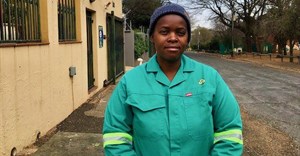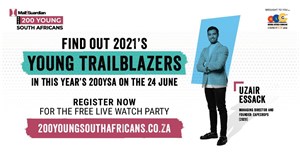
Subscribe & Follow
Jobs
- E-commerce Manager Johannesburg
- CRM Specialist Sandton
- Production Administrator Cape Town
- Creative Intern Houghton Estate
- Coordinator - Marketing and Events Johannesburg
- Brand Promoter Paarl
- PPC Specialist / Google Ads Specialist Johannesburg
- Creative Director Cape Town
- Channel Marketing Specialist Pretoria
- Group Digital Marketing Manager Cape Town
What Joburg should learn from Vodacom
The Star (factual misconceptions about the legendary King Canute aside) decried the project in an editorial (4 December 2012), suggesting the city's management should rather simply look to the vast list of complaints and fix those ills.
That is sound advice. They can also look at the panoply of blunders by private sector brands and learn from them. Especially where those fiascos arose specifically as a result of not heeding what public perceptions were shouting. Recent exposés about Vodacom, swan-diving spectacularly off the cliffs as South Africa's leading cellular brand, have illustrated what happens if companies, even the richest, biggest and shiniest, ignore the dictates of how their customers perceive them.
Where branding has long been the proactive creation and sustenance of a corporate image, perceptual branding is more reactive, responding to fluctuations and taking greater (not exclusive) cognisance of existing fluid adjustments and adaptations in public perceptions about the brand. It's all about the experience customers have with the brand, the ongoing interaction they have and the long-term relationship. Yes, it does affect brand loyalty, but increasingly its ultimate impact on profits is being felt.
Don't ignore the 'ten commandments'
Despite the volatility of the telecommunications game in South Africa, Vodacom ignored "ten commandments" governing such a heavily consumer-driven and competitive arena. Its blunders are pragmatic lessons for Joburg. The megalith - as megalithic structures are wont to do - also chose a patronising approach toward its millions of clients amnesiac in understanding the changing social paradigms and the power of the very tools with which it is flooding South Africa.
As Jane Duncan, professor at Rhodes University's School of Journalism and Media Studies wrote recently: "Cellphone users are sick and tired of high costs, network disruptions, dropped calls and inefficient call centres. They are fed up with voice and data bundles expiring when there is no technical need for them to. They are 'gatvol' with the companies boasting that they are rolling out Long Term Evolution or 4G networks, when many mobile Internet users don't receive a proper 3G service, and are forced to rely on the antediluvian Edge technology."
So hey, City of Joburg, here are 10 lessons to be learnt from Vodacom's blunders:
1. Don't brand yourself as something you cannot live up to
Following in the well-worn footmarks of Avis, Vodacom made the glaring mistake of trying to brand itself as customer-orientated. It is not. Nor is it likely to become. Customer amity is not something you have any measure of head-office control over. It must be an ethos, a commonality of culture into which every client-contact person buys without equivocation. It is a lived experience much like a military code of conduct. Client-centredness must permeate every level of an organisation and most keenly it must be lived by the top-most echelons. And it must be seen to be lived.
2. Have a highly visible & responsive CEO (or persona)
Few things rally the troops, boost morale or engender trust as remarkably as a leader who is out in front, who is getting his or her hands dirty, who is demonstrating grit and follow-through, who is putting his or her money where their mouths are and who is high-profile, eloquent and competent enough to spur the most battle-fatigued grunt in the most distant outpost. This iconic leader role must be a public persona. It is, as Barack Obama recently demonstrated, where the buck starts and where it stops. Cell C botched this with comedian Trevor Noah. FNB's "R B Jacobs" persona seems closer to the mark. Vodacom's new CEO, Shameel Joosub has distinguished himself by being all but invisible and insensitive.
3. Create many channels for feedback
The hyper-connected world is multi-channelled. Though we have moved or are moving away from some channels - faxes, letters, print media among others - for each one that is cut off two new ones rise Hydra-like. The modern consumer expects these to be used and judges companies that fail to meet their expectations harshly and speedily. Neither are clients satisfied with being fobbed off with stock replies. Off-the-shelf replies are perceived as demeaning and provoke greater hostility. Consumers, or in Vodacom's case, users demand they be heeded and, when one channel fails or is perceived to fail - e.g. Vodacom's customer care email - they will escalate to a higher level.
4. Always heed all feedback - especially client feedback
Not only is the modern client increasingly discerning and demanding but she wants to be involved in changing the way corporations behave. Look at any of the mushrooming cloud of consumer surveys and the lessons are clear as daylight. Simply plonking tacky, badly formulated and remote "robotic" voices at the end of a phone do not a responsive company make. Conglomerates, especially in diversified and multipronged industries such as telecommunications, need to show they are listening to feedback and acting on it with haste. Vodacom continues to fail in this sphere and clients have been quick to pick this up. Given the sheer variety of direct involvement open to consumers it is fallacious to focus on only one or two channels - and definitely not only those company directed ones such as a website or email. Ignoring these alternative channels is not only myopic but could be seriously damaging by having corporate brands repeatedly exposed to public ridicule.
5. Research to respond - don't research to justify
Whereas many modern companies seem fixated on post facto research, the modern fluid market place demands extensive client-focused research before the fact. Both in its LTE/4G and end-of-year "Double Your Summer" ad campaigns, Vodacom has failed to recognise how harshly it is being judged. It is all well and good that new technologies demand breakneck speed in bringing them to market, but today's consumers are invariably well aware of the promises and pitfalls of new-tech long before it hits shelves or company websites.
6. Demonstrate your ethos & live it large
This applies to whatever the chosen corporate ethos or culture is, based on research in response to market demands, and is the primary reason why cottonwool-and-candyfloss statements such as "Power to you" are virtually impossible to realise because they're just too vague. Vodacom has made itself guilty of what are perceived as woefully unnecessary and obstructive so-called "security" questions ranging from demanding customers' identity numbers to the outright silliness of questions about when last a client recharged on a pre-paid account. This only makes them look silly.
7. Don't advertise or sponsor to cover up corporate shortcomings
In popular perception this is precisely what Vodacom - and other corporations such as Absa and KFC - have tried to do. The frustrated client who feels ill-served will ask: "How can they throw money at sponsorship, but they cannot provide a better service?" The greater good is erased by the particular harm. The City of Joburg needs to be conscious of this.
8. Shun spam-vertising & define market areas
Far too many companies that should know better still make this grave mistake. Any communication is good communication, they insist. Nothing could be further from the truth. The discerning consumer has become adept at recognising spam and is deeply insulted by it. Fusillades of promo-mails, discounts, special offers are more often than not deleted the instant they appear in an inbox. The barrage of communications is one factor behind the unprecedented catch-on of Twitter. Less is more; more than ever before. Spam-vertising and spammunication may conceivably have a place, but they need to be carefully aimed and well-weighted to ensure they aren't mistaken for sleight of hand.
9. Fix it - always Right, always First Time
This is admittedly easier where a complaint is about a "fixable" fault such as the perennial poor signal as opposed to general anger or dissatisfaction with service or calls/data. This backlash is often unfair, but it's part and parcel of the market ecology. Building and sustaining a positive client experience (a strong suit of former Vodacom CEO Pieter Uys) can alleviate the pain as clients are more forgiving if the overarching brand perception is strong. The alarm claxons of Joburg's billing catastrophe still resound.
10. Lawyers are disasters looking for a place to happen!
This has been a very hard pill for litigious companies like Vodacom and Absa to swallow. It may be they feel they have to justify their costly legal divisions, but bouncing complaints, no matter how unfair they may be, to "legal" is seen as the action of a company "that knows it has done wrong and is trying to minimise damage", as one Twitter user put it. In this context especially do not break the law. All cellphone companies remain solidly in breach of Section 63 of the Consumer Protection Act by imposing expiration terms on their voice and data bundles. They have made representations to the National Consumer Commission and the issue is still on the table. Though unproven, rumours of obstructing the process linger. The better and ultimately positive approach would have been to obey the letter of the law, sacrificing short-term profits for long-term perception points. Or at least, have demonstrated good faith by meeting the three-year stipulation of the CPA halfway. In frustration angry consumers have lodged a complaint with the Public Protector, South Africa's pre-eminent watchdog, as well as with the NCC.
Naturally there are areas of overlap between perception and conventional branding and image curatorship, but a rule of thumb seems to be the bigger and less sensitive an organisation is perceived to be, the more caution it needs to exercise around how it is perceived by clients.
Vodacom has shown how not to manage this reality. City of Joburg, you've been warned.




















